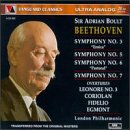| All Artists: Beethoven, Boult, London Philharmonic Orchestra Title: Beethoven Symphonies # 3 ("Eroica"), # 5, # 6 ("Pastoral"), & # 7/Four Overtures Members Wishing: 1 Total Copies: 0 Label: Vanguard Classics Release Date: 5/23/1995 Genre: Classical Styles: Forms & Genres, Theatrical, Incidental & Program Music, Historical Periods, Classical (c.1770-1830), Symphonies Number of Discs: 3 SwapaCD Credits: 3 UPC: 723918001128 |
Search - Beethoven, Boult, London Philharmonic Orchestra :: Beethoven Symphonies # 3 ("Eroica"), # 5, # 6 ("Pastoral"), & # 7/Four Overtures
 | Beethoven, Boult, London Philharmonic Orchestra Beethoven Symphonies # 3 ("Eroica"), # 5, # 6 ("Pastoral"), & # 7/Four Overtures Genre: Classical
|
Larger Image |
CD Details |
CD ReviewsRobust beethoven Mr. Ian A. Macfarlane | Fife, Scotland | 03/13/1999 (5 out of 5 stars) "these performances come from the late 50s. I've had them on LP since then. They last, and it's very nice to see them available on Vanguard CDs (despite the fact that Boult was a great and much loved British conductor, they are not on general isue in Britain). Boult went for integrity and a truthful approach to the music - no flamboyance or quirkiness. What makes his work a bit more tha just worthy literalness is two things ; he was excellent at seeing a work as a whole and climax-building, and he was equally excellent at clearing the feel of a genuine performance rather than a more clinical 'studio' impression. That means occasional roughness in the playing, and the LPO then was less good than it is now, but to compensate there is some lovely playing (espec. in the winds) and a forward-moving, committed approach that is very attractive. You hear this especially in the 'Pastoral', with the slow movement at Beethoven's metronome mark (i.e. very flowing) and the final movement 'unusually ardent', as 'The Gramophone' said when the LPs were issued. The Storm in that symphony has a most terrific climax and is very exciting, not because of sheer loudness but because of the strength in the lower strings and the commitment of the playing. Boult conducted the 7th. with Toscanini's NYPO in the 30s, and it was a bit of a speciality of his. The performance here is very straightforward and , again, flowing, and in the end it's very satisfying. So too with the 'Eroica' and the 5th., which really builds to the exultant last movement. No-one would buy these discs for the overtures alone, but in fact they are every bit as good as the symphonies, with 'Leonora No. 3' in particular alive from the first moment and very exciting at the end ('Coriolan ' - a very different kind of piece - is also first-rate). In the end, what I'd say matters most is that these performances, nearly 40 years old, still sound fresh, and they do the music full justice. The CD remastering is very fine and the sound is immediate and alive (it was always pretty good). In short, these discs are well worth hearing." Boult allows beethoven to speak for himself Mr. Ian A. Macfarlane | Fife, Scotland | 02/16/1999 (5 out of 5 stars) "Sir Adrian Boult was famous for 'straight' performances, absolutely faithful to the composer.This Beethoven is exactly that. For recordings from the late 50s, when they were isuued on LP, they sounds marvellous. Throughout, these are 'real' performances, no extreme speeds, no 'see-me' interpretative points, but gritty, very wellbalanced and strong. I like the 'Pastoral' for its freshness and (in the last movement) its ardour, the 5th. for its directness and the marvellous view of the movements as a whole - as if, in a concept from one of Mazart's letters that Boult often referred to when explaining his own approach to the structural side of symphonic music, the music is like a mountain range with a number of peaks, one higher than all the others, which can be comprehended as a whole. The 7th. is fine too - that was the symphony Boult chose to conduct with Toscanini's NYPO in the 30s when he visited the USA. The overtures are just a fine as the symphonies, and the overall effect is bracing and refreshing. While the LPO was not a sgood an orchestar then as they are now, they play with a lot of character and commitment. Strongly recommended." Musica integrity stephengolding | abingdon, oxon United Kingdom | 08/16/2000 (4 out of 5 stars) "A fine example of Sir Adrian Boult's complete and utter faithfulness to the score in front of him; nothing in these performances stikes the listener as out of place or uncharacteristic. What a pity he never completed the cycle!"
|

 Track Listings (5) - Disc #1
Track Listings (5) - Disc #1